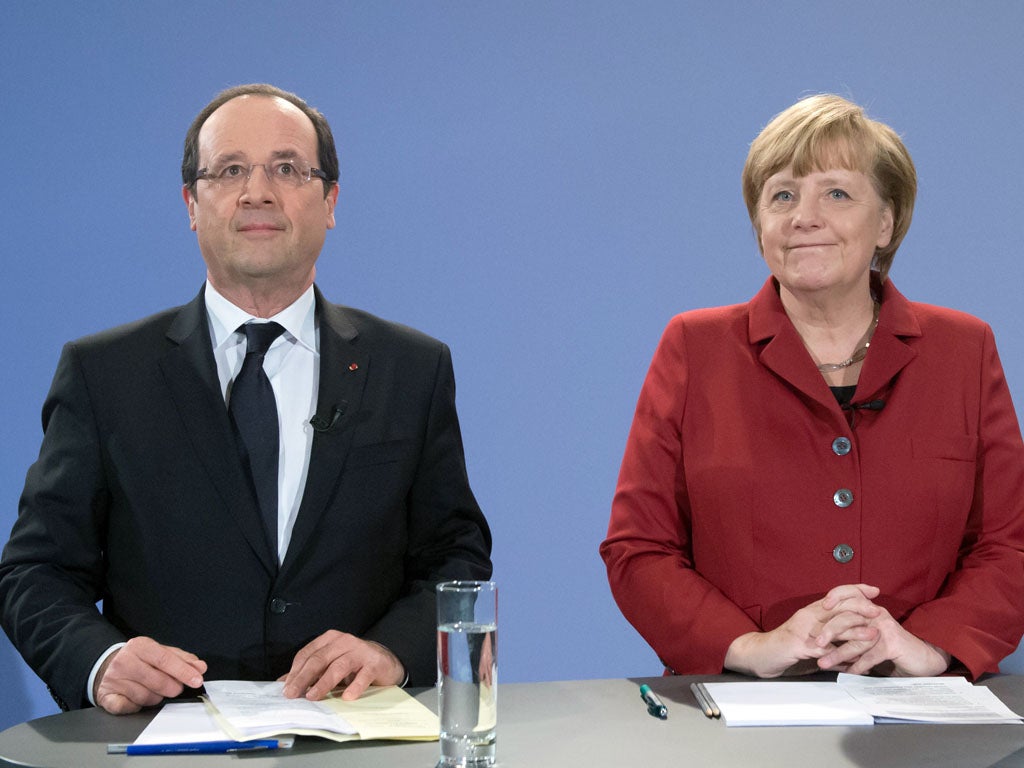Your support helps us to tell the story
From reproductive rights to climate change to Big Tech, The Independent is on the ground when the story is developing. Whether it's investigating the financials of Elon Musk's pro-Trump PAC or producing our latest documentary, 'The A Word', which shines a light on the American women fighting for reproductive rights, we know how important it is to parse out the facts from the messaging.
At such a critical moment in US history, we need reporters on the ground. Your donation allows us to keep sending journalists to speak to both sides of the story.
The Independent is trusted by Americans across the entire political spectrum. And unlike many other quality news outlets, we choose not to lock Americans out of our reporting and analysis with paywalls. We believe quality journalism should be available to everyone, paid for by those who can afford it.
Your support makes all the difference.The German and French governments have offered David Cameron a deal that partially meets his demands to renegotiate European Union migrant welfare rules, it has been reported.
The Politico Europe website cites French officials close to the talks who say Francois Hollande and Angelea Merkel have told Mr Cameron they would support EU migrants being banned from claiming in-work benefits for three years.
Banning EU migrants from claiming in-work benefits, like tax credits, for four years when they first arrived is Mr Cameron’s main goal in the talks.
“British officials are open to compromises and alternatives, and David Cameron got the impression last week that several heads of state and government were ready for compromise as well,” a French official close to the talks reportedly told the website.
“There was a coordination between Hollande and Merkel to launch the idea of discussing possible compromises on this issue, ideally compatible with [EU] treaties.”
The welfare rules change is one of four pillars Mr Cameron has specified. The other three are protection of the single market for non eurozone states, cuts to regulation, and an exemption for the UK from the “ever closer union” clause of EU treaties.
Eurosceptic figures, including Ukip leader Nigel Farage, have accused Mr Cameron of already significantly rowing back on earlier rhetorical commitments to challenge the EU’s principle of freedom of movement, however.
The German and French proposed deal might not require the unanimous support of all EU states if it was conducted within the framework of existing treaties – something Downing Street has long said it might.
Poland’s new prime minister Beata Szydło told Mr Cameron on a recent trip to the country that she did not see “eye to eye” with him on some issues.
Other states with large numbers of nationals living abroad have also expressed opposition to the changes. If treaty changes were required for a deal unanimous support for proposals would be required.
The UK could vote on whether to keep its Europe Union membership as early as next summer, with a referendum due by the end of 2017.
The plebiscite was pledged in the Conservatives’ 2015 election manifesto, pending a renegotiation of the terms of membership of the EU by Mr Cameron.

Join our commenting forum
Join thought-provoking conversations, follow other Independent readers and see their replies
Comments